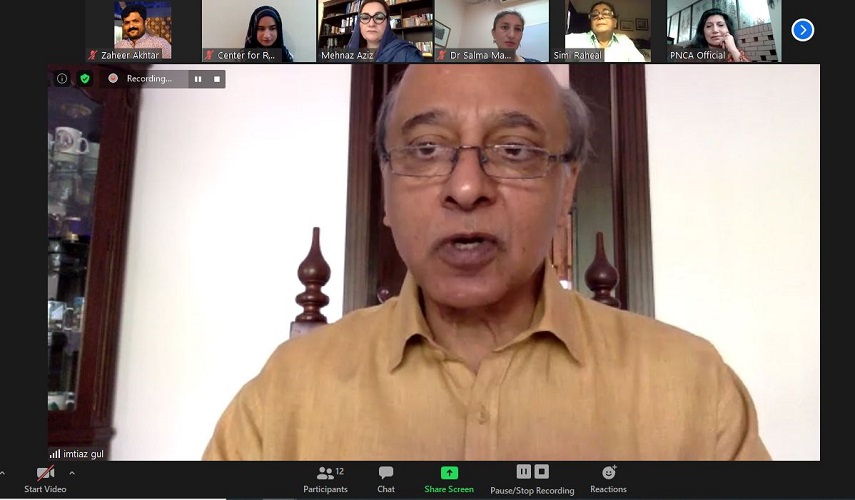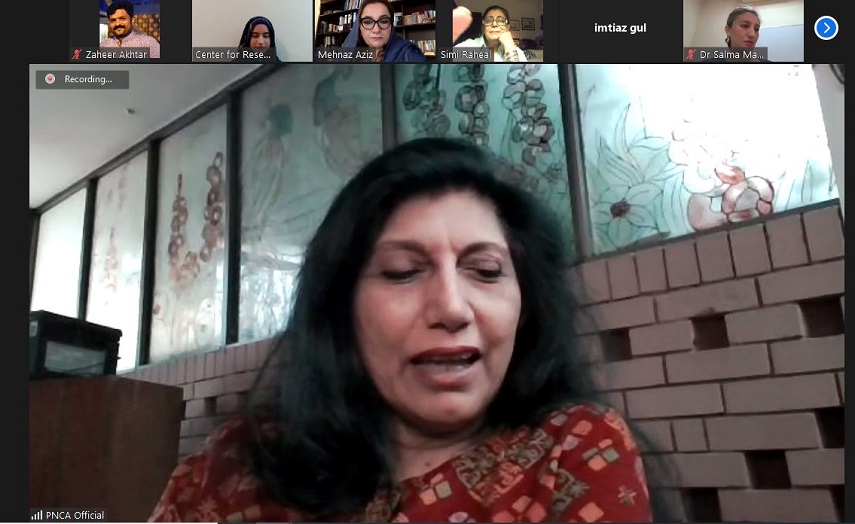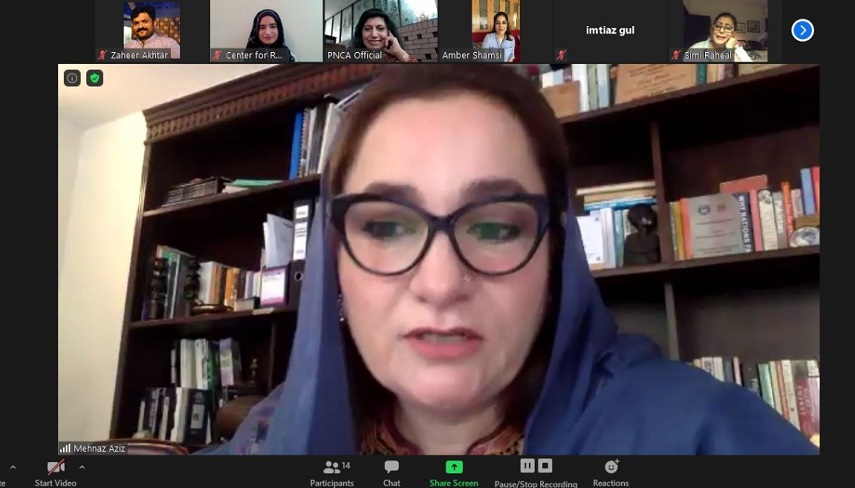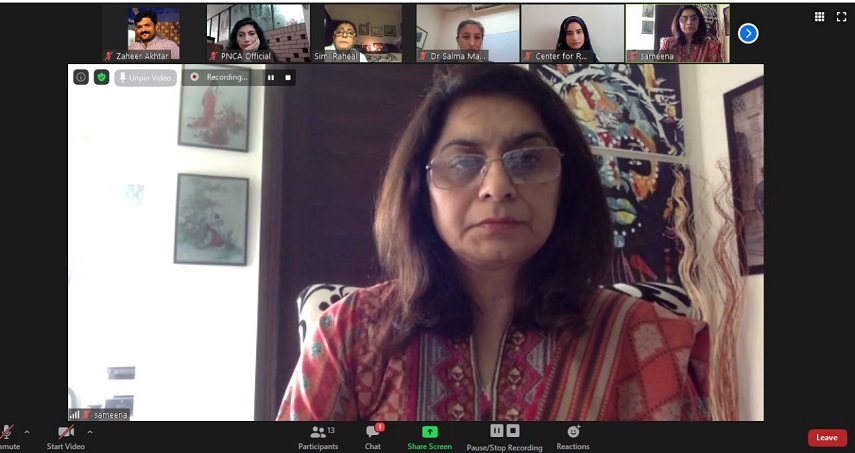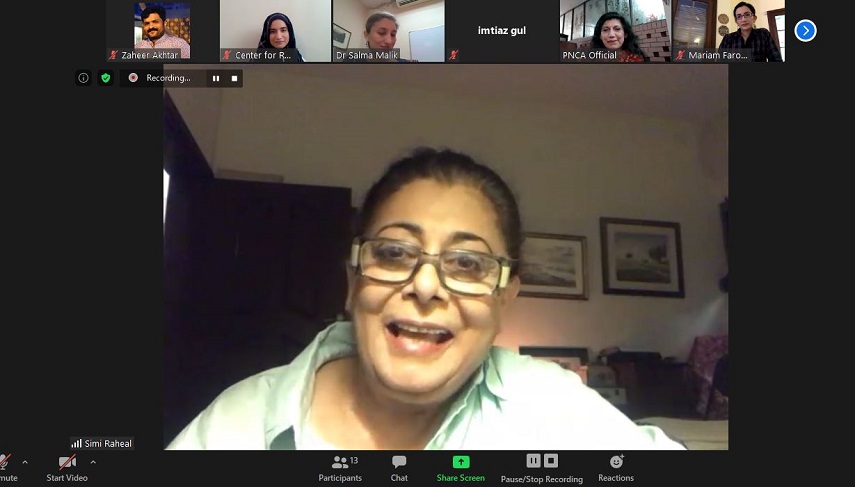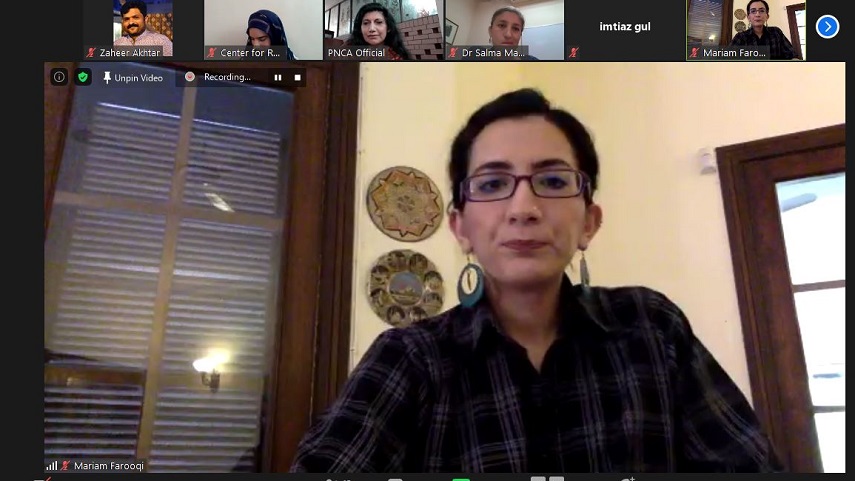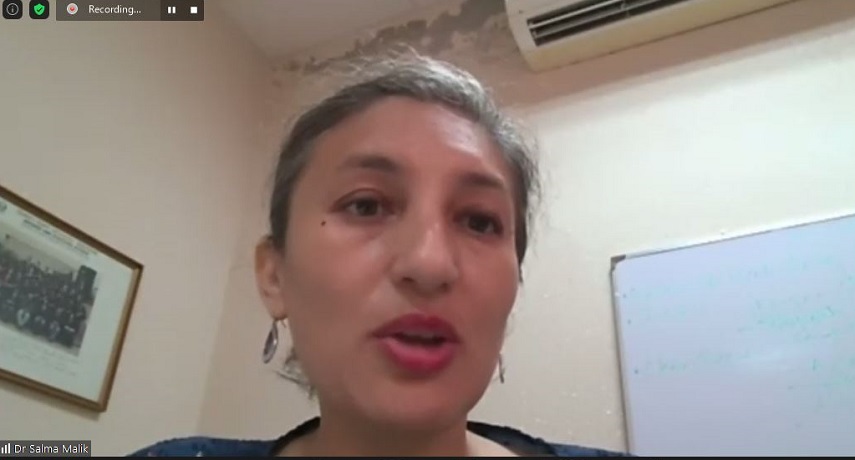As part of CRSS’ efforts to improve Pakistan-Afghanistan bilateral relations under its ongoing Track 1.5/II initiative Beyond Boundaries, CRSS conducted a strategic sideline meeting of Pakistan members of PAJC on July 09, 2020, on the theme, “Cultural Commonalities & Connectivity Amid COVID-19” on Zoom. The meeting aimed to be one of CRSS’ efforts focused on highlighting the cultural commonalities between the two countries as a way to strengthen a positive people to people relation. The objective of the meeting was to gather recommendations and proposals from experienced artists, journalists, academics, art historians and other senior members present on how Beyond Boundaries can lobby to highlight cultural commonalities between the two countries and encourage connectivity especially in the prevailing difficult environment posed by COVID-19.
Delegates included Mehnaz Akber Aziz, Member National Assembly – PML-N; Dr. Fouzia Saeed, Director General, Pakistan National Council of the Arts (PNCA); Simi Raheal, Development Trainer and Media Professional, Amber Rahim Shamsi, TV Presenter and Anchor, Samaa TV; Sameena Imtiaz; Senior Development Professional, Dr. Salma Malik, Assistant Professor, Department of Defense & Strategic Studies, Quaid-i-Azam University; Myra Imran, Journalist, The News International and Mariam Saleem Farooqui, Art Historian. CRSS was represented by Executive Director Imtiaz Gul, Zeeshan Salahuddin; Director Strategic Communications, Sitwat Waqar Bokhari; Program Manager, Junaid Khan; Program Manager, and Saad Gul, CRSS Research Fellow.
At the outset, Executive Director Imtiaz Gul welcomed all participants and briefed them on the objectives of Beyond Boundaries. He stated that this meeting was a way to bring relevant experts together so they can come up with constructive recommendations for the governments as well as the concerned civil society groups to explore the avenues around cultural commonalities which should be promoted. During these testing times, particularly, connecting through culture seems the most viable option, in his view.
Director General, Pakistan National Council of the Arts (PNCA), Dr. Fouzia Saeed, in her opening speech, stated that Pakistan and Afghanistan hold a very strong relationship in terms of the link between the people on both sides, as also evidenced by Pakistan’s hosting of the Afghan refugees for over four decades. Due to the cultural similarities, the Afghans faced no cultural hindrances while adjusting with the Pakistani local community, she said.
While shedding light on the activities held by PNCA during the pandemic over the last four months, Dr. Saeed stated that the PNCA optimized the full use of the digital resources to continue their activities. These included online concerts, tributes to veteran artists, short documentaries with specific messages and music jamming sessions. Dr. Saeed proposed that these could also be conducted through the digital forum between Pakistan and Afghanistan to connect the two people together in this testing time and mitigate the state-to-state mistrust, thereby. Furthermore, Dr. Saeed briefed that the PNCA has also offered various online courses for students of arts from all over Pakistan. She graciously announced that she would like to offer these courses to the students of Afghanistan as well.
Member of National Assembly, Ms. Mehnaz Akber Aziz, in her welcome remarks, stated that Pakistan and Afghanistan not only share common elements of ethnicity, language, shared history, clothing, food, music, weather, nationality, geography and values but also religion and similar cultural rituals. Most of these shared values have been reinforced by the presence of the 1.5 million Afghan refugees whose movement Pakistan did not restrict in the country at all. As a result, Afghan culture has blended into many customs in the Pakistani society. Tapping on the vast cultural commonalities that exist between the two neighbors, Ms. Aziz urged to explore avenues for cultural collaborations and cooperation and appoint cultural ambassadors who can play the role of bridging cultural collaborations across both countries. This, in her view, could greatly aid in mitigating the existing mistrust and political tensions at the state level.
As a core member of Beyond Boundaries, Ms. Aziz referred to the proposal to set up a Pak-Afghan Women Caucus in the parliament at the women-led conference held in June and suggested that cultural collaborations could become one of the integral components of the caucus. She also expressed that she would share the recommendations from Beyond Boundaries’ meetings with the Pakistan-Afghanistan Parliamentary Friendship Group in the Parliament which would assist in future policy-making regarding the two countries’ relations. Cooperation in trade and commerce, media, sports, music, arts and culture, academics, civil society partnerships and youth exchange programs, can be common grounds to lobby for sustainable peace and stable bilateral relations.
Senior development professional, Ms. Sameena Imtiaz seconded Dr. Fouzia’s recommendation to enroll Afghan students in PNCA’s art courses and to conduct joint virtual art events in the digital space. She also suggested exploring various avenues of future collaborations in different art and culture fields with the PNCA between CRSS and PNCA.
Development trainer and media professional, Ms. Simi Raheal, with over three decades of experience, stated that while the COVID-19 pandemic has presented challenges, the prevailing situation also offers many opportunities due to the absence of logistical hurdles, allowing informal arrangements, virtual availability and interaction of relevant participants simultaneously from different locations. Amongst the commonalities shared by Afghanistan and Pakistan, Ms. Raheel stated that, the textile industry has the most potential for collaboration as it is growing in both countries. On the design front, she stated that the modern digital transformation allows the designers to exchange their textile design and patterns online which can create enormous business opportunities for the stakeholders associated with this industry.
Art Historian, Mariam Farooqui, while shedding her expert opinion on art exchanges, stated that both countries need to connect through art. Quoting the example of the developed countries, Ms. Farooqui stated that many institutions in these countries offer professional degrees in art while, thereby, also preserving their art and culture. Unfortunately, this is not witnessed in South Asia. A lack of connectivity between South Asian countries is the main reason for the loss of art and cultural history where the promotion of art and cultural heritage is a neglected field. She proposed that to bridge this gap in South Asia, there should be art degrees introduced in institutions across both countries and scholarships provided by the government to encourage the preservation and promotion of art and cultural heritage.
On the promotion of art exchanges, Ms. Farooqui commented that the contemporary art by Afghan artists are phenomenal. She further suggested that public art done by modern artists should be encouraged in office buildings as well. In order to strengthen the opportunities and connectivity in this domain, virtual art exhibitions must be conducted and encouraged in both countries.
While shedding light on the need to improve media narratives in both countries, TV presenter and anchorperson, Ms. Amber Rahim Shamsi, shared her concern that the contemporary private media streams seek profitability and viewership while determining their content and will only air issues which they think could increase their viewership. In her view, art and cultural promotion is an untapped field in both countries in terms of its media propagation. However, she stressed that the civil society should continue lobbying to the mainstream media to showcase and promote art and culture as a way to sensitize viewers and bring the people of Pakistan and Afghanistan together. However, in the absence of the main media, alternate digital platforms such as Youtube, Facebook, Instagram and Twitter, etc, could be used as a key tool to project art exchanges.
While seconding Ms. Shamsi, senior journalist for The News International, Myra Imran, stressed on the importance of using the digital platform for art and cultural exchanges and for changing perceptions amongst the people of both countries through social media outreach. Furthermore, she stated that as the state-to-state relations between the two countries are not that strong, cultural interaction between the two countries can be key to bringing them closer and ensuring sustainable peace.
Assistant Professor at Quaid-i-Azam University, Dr. Salma Malik, who was moderating the interactive discussion session, commended the CRSS on bringing together such vibrant and relevant delegates to discuss such as an important field for collaboration and cooperation with Afghanistan. She was optimistic that suggestions from such meetings will be tabled to relevant policy makers and institutions and lead to tangible materialization of cultural exchanges and ultimately mitigating of mistrust.

